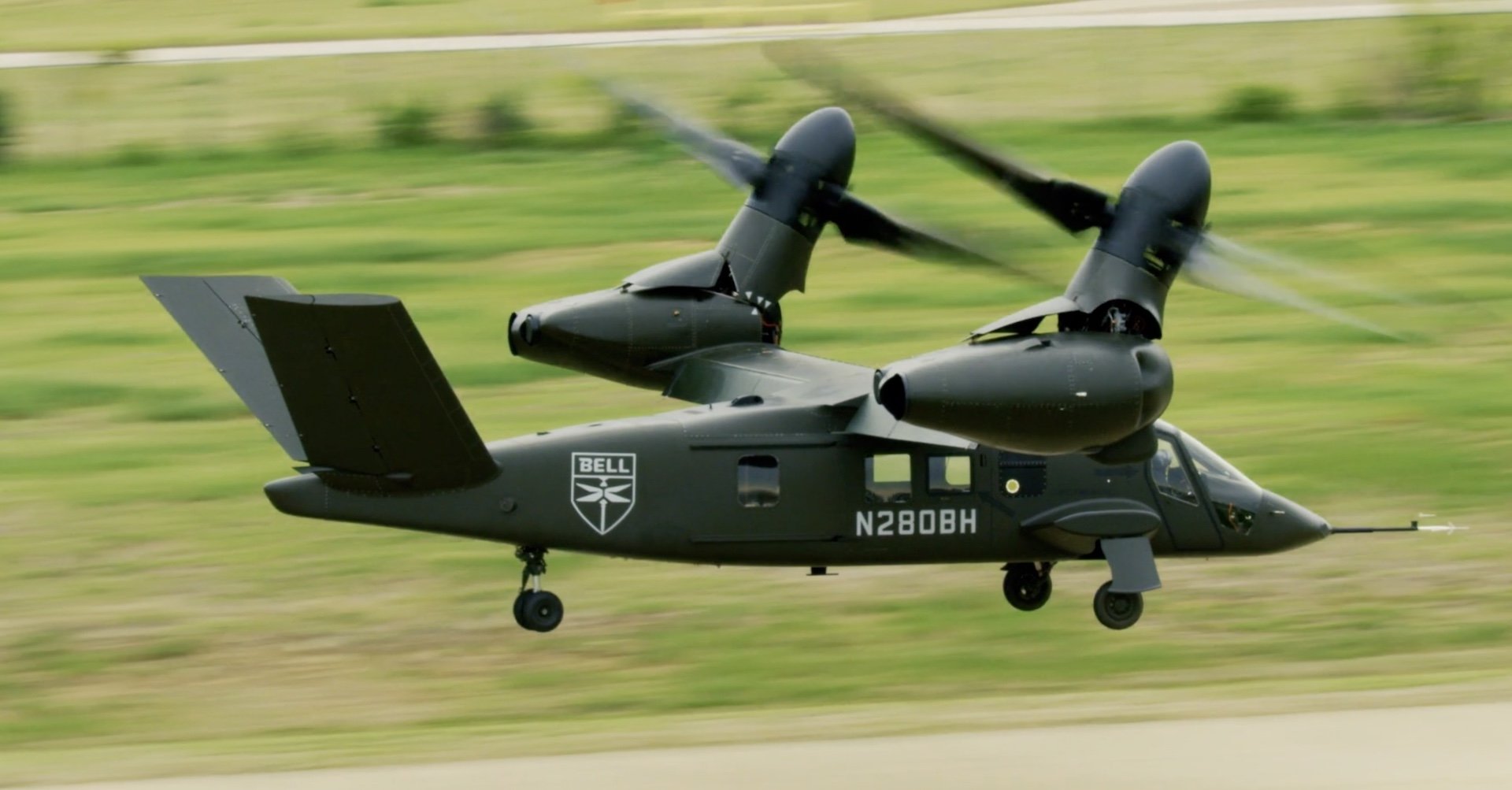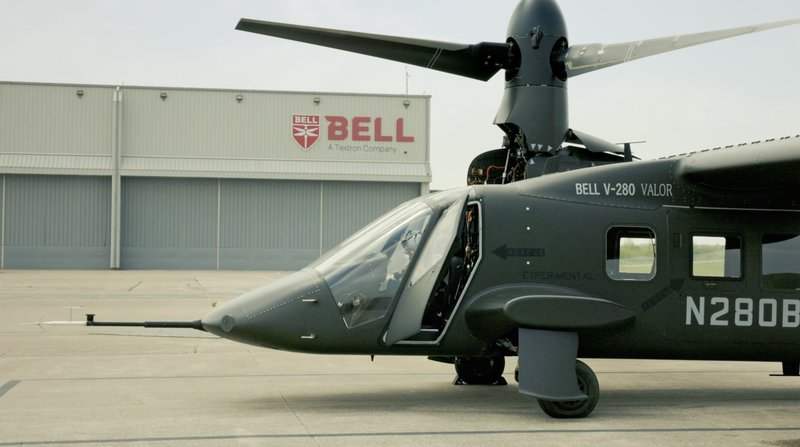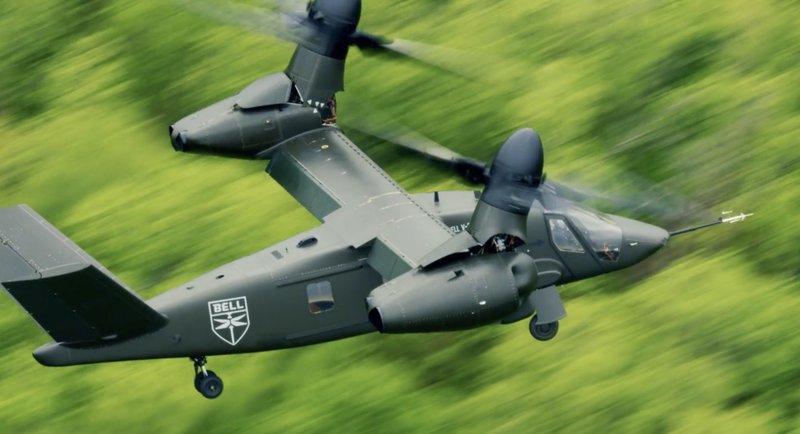
The Army named the Bell V-280, a tiltrotor aircraft, as its next primary tactical troop and cargo transporter, eventually replacing the Black Hawk. Photo courtesy of Bell.
The Army named the Bell V-280 tiltrotor as the aircraft it wants to see eventually replace its iconic but four-decade-old H-60 Black Hawk at the center of its aviation corps.
In an announcement that ended a yearslong competition, the Army said on Dec. 5 that the V-280 will be phased into the service as its primary transport and assault aircraft, beating out a competitor from Sikorsky-Boeing.
Maj. Gen. Robert Barrie, the Army’s program executive officer for aviation, told Defense News that the first deliveries are several years away.

The Bell V-280 uses tiltrotor motors, a design similar to that of the V-22 Osprey. Photo courtesy of Bell.
“There are zero aircraft being procured in the initial portion,” Barrie said. But once underway, the program could grow to at least $70 billion over the next several decades.
The Army named the V-280 as the winner of the Future Long-Range Assault Aircraft competition. It beat out a competing design from Sikorsky-Boeing dubbed the Defiant X. Both aircraft defy current helicopter designs.
The V-280, which Bell calls the Valor, is a tiltrotor design, with engines on either end of stubby wings that rotate for landing and forward flight. The design is similar to — though smaller than — that of the Air Force and Marine Corps' V-22 Osprey.
The Defiant used coaxial overhead rotors.
The decision represents a generational win for defense contractor Bell, replacing a system at the heart of how the Army operates. The award all but assures decades of lucrative deliveries, upgrades, and maintenance contracts with the Army and potentially with other services and international Black Hawk users.
The UH-60 first flew in 1974 and was put in service with the 101st Airborne in 1979. The helicopter first saw combat in the 1983 invasion of Grenada and became perhaps the United States' most recognizable aircraft in the post-9/11 era, rivaling even sleek fighter jets as the international emblem of American military projection.
The helicopter first grabbed the public eye in the movie Black Hawk Down, which chronicled its use by special operations forces in Somalia. And for the last two decades, Black Hawks were ubiquitous during the wars in Afghanistan and Iraq and in counterterror operations worldwide.

The Army picked the V-280 tiltrotor to replace the H-60 Black Hawk as the backbone of its aviation fleet. Photo from Bell.
The Army has over 2,100 Black Hawks in its inventory and has ordered at least another 120 to be built by 2027, an indication of the slow pace at which the V-280 is likely to be adopted. About 750 are undergoing upgrades that will convert them to UH-60Vs.
The Navy flies over 500 Sea Hawk versions of the H-60, and the Air Force has over 100 Black Hawks in its search and rescue forces. The helicopters are also used by other US government agencies.
The Marine Corps uses VH-60s for presidential transportation duties, flying as "Marine 1," making the H-60 one of just two airframes regularly flown by all four services (the other is the C-12, a small propeller plane flown as both a VIP transporter and electronic spy plane).
Along with the US, 28 other countries fly the Black Hawk.
Read Next: Five 10th Mountain Soldiers Arrested for Rape Near Fort Polk

Matt White is a former senior editor for Coffee or Die Magazine. He was a pararescueman in the Air Force and the Alaska Air National Guard for eight years and has more than a decade of experience in daily and magazine journalism.
BRCC and Bad Moon Print Press team up for an exclusive, limited-edition T-shirt design!
BRCC partners with Team Room Design for an exclusive T-shirt release!
Thirty Seconds Out has partnered with BRCC for an exclusive shirt design invoking the God of Winter.
Lucas O'Hara of Grizzly Forge has teamed up with BRCC for a badass, exclusive Shirt Club T-shirt design featuring his most popular knife and tiomahawk.
Coffee or Die sits down with one of the graphic designers behind Black Rifle Coffee's signature look and vibe.
Biden will award the Medal of Honor to a Vietnam War Army helicopter pilot who risked his life to save a reconnaissance team from almost certain death.
Ever wonder how much Jack Mandaville would f*ck sh*t up if he went back in time? The American Revolution didn't even see him coming.
A nearly 200-year-old West Point time capsule that at first appeared to yield little more than dust contains hidden treasure, the US Military Academy said.












